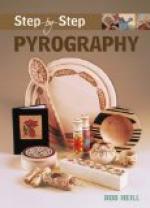Lady Philippa was twisting a vine-garland into a leafy canopy to keep the sun from the baby’s eyes. “’Tis a pretty baby,” she said, “though so small. The cow that was lost in the marsh—how did that happen?”
The old woman’s eyes blazed with hatred. “My lady, the lads of the village drove her there, and the poor hunted beast floundered into a quagmire. I cursed them well for it, but that does not bring back the good cow. And Howel will do nothing for me because the child is so weazened and so small.”
The lady frowned. “It is all wrong,” she said, “the lads’ cruelty and the cursing of them and the blame of the woman who thought you had witched her child. Sir Walter shall send you a goat that you can tether within sight of the cottage. In my country the folk often feed their babes on goat’s milk, and I would like well to taste goat’s milk cheese again. Is Howel at work now?”
“He was, my lady, but since he fell into the water he swears that he will work no more on the wall.”
Lady Philippa spoke but with winsome frankness,—“The men say, good mother, that the wall is witch-ridden because it has fallen thrice. They are afraid, that is why they do not reason. Surely in God’s world we should be safe from such evil, if we serve Him. Perhaps if the baby grows fat and merry, Howel will be kinder. Has it been christened yet?”
“Nay—what have we to do with such gear? But my lady—heard ye never the old rhyme—
“‘Overlook the Fairies’ Well—
None did that since Adam fell;
Overlook the Fairies’ Hill—
Then Old Nick shall have his fill.’”
“That has naught to do with our castle,” said the lady wonderingly. “Look--the keep is no higher than your roof-tree. My lord chose not the site for its loftiness but for the sure foundation.”
“Aye,” chuckled the old woman, “you say well, ’tis a good foundation. All but that corner. Tell your lord to raise no towers on that corner.”
“I am sorry the wall has given so much trouble,” Lady Philippa said regretfully, “for that is the only place for my garden—my roses and violets and herbs. My lord will try once more to finish it. If I might have but that piece of garden it would be like a bit of my old home, and that is a dear treasure, Mother Izan, in a foreign land.”
Her voice trembled as she spoke, and Eleanor pressed close to her mother’s side and held her hand. She had never heard a word before about her mother’s longing for Provence.
As the three rode away old Izan stood for a long time, shading her eyes and gazing after them. Next morning a village boy in charge of Roger came up the path to her door, leading two bleating bewildered goats, which were securely fastened to a stake to graze at will.
“I came myself,” said Roger loftily, “because I meant to make sure that it was all right. I haven’t forgotten the time you cured my leg, Mother Izan, and neither has father. Have those blue-tit eggs hatched yet?”




